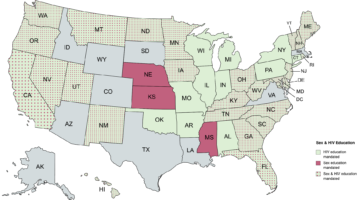The US Government is Poised to Move Backwards on Sex Education
June 21, 2017 by Justin Lehmiller
In the final budget proposal submitted by the Obama administration last year, funding for abstinence-only sex education was put on the chopping block. They proposed eliminating abstinence-only programs entirely and, although it didn’t ultimately come to pass, their proposal at least showed recognition of the fact that we need a new approach to sex education in this country. Study after study has shown that promoting abstinence only just doesn’t work. In fact, if anything, it seems to be counterproductive. For example, research has found that the U.S. states with the most abstinence-only programs actually have the highest rates of teen pregnancy [1]!
What works when it comes to sex education is a comprehensive approach—one that gives teenagers the information they truly want and need to know, and that will enable them to establish safer and healthier sexual relationships. Indeed, comprehensive sex education is linked not only to lower rates of teen pregnancy [2], but also lower rates of STI-risk behavior [3].
Unfortunately, the current administration wants to move backwards on sex education. Sad!
In the Trump administration’s proposed budget for 2018, they seek to retain abstinence-only sex education by funding it to the tune of $160 million. To be clear, these are programs that tell students they should remain sexually abstinent until marriage.
It’s worth noting that the average age of first intercourse in the U.S. is 15-16, while the average age of first marriage is almost 30 these days. You read that right–keep it in your pants until you’re 30, kids! I don’t know about you, but it seems rather unrealistic to me to think that any sex education program is going to suddenly start convincing teenagers that they should wait 15 more years before they start having sex.
As if spending so much money on programs that have unattainable goals and don’t work isn’t problematic enough, the current administration has also proposed eliminating funding for evidence-based approaches to sex education. They’ve also proposed cutting nearly $150 million in HIV research and prevention work on the part of the CDC.
If this budget proposal is ultimately adopted, Americans’ sexual health will suffer for it. Fortunately, however, this is only a proposed budget and we must wait and see what Congress decides to do. Here’s to convincing our legislators that decisions about sex education should be based in science, not personal opinion or belief.
For more details on these and other implications of the new proposed federal budget for sex education and research, see here.
Want to learn more about Sex and Psychology ? Click here for previous articles or follow the blog on Facebook (facebook.com/psychologyofsex), Twitter (@JustinLehmiller), or Reddit (reddit.com/r/psychologyofsex) to receive updates.
[1] Stanger-Hall, K.F., Hall, D.W. (2011). Abstinence-only education and teen pregnancy rates: Why we need comprehensive sex education in the U.S. PLoS ONE 6(10): e24658. doi:10.1371/journal.pone.0024658
[2] Kohler, P.K., Manhart, L.E., & Lafferty, W.E. (2008). Abstinence-only and comprehensive sex education and the initiation of sexual activity and teen pregnancy. Journal of Adolescent Health, 42, 344-351. doi:10.1016/j.jadohealth.2007.08.026
[3] Stanger-Hall, K.F., Hall, D.W. (2011). Abstinence-only education and teen pregnancy rates: Why we need comprehensive sex education in the U.S. PLoS ONE 6(10): e24658. doi:10.1371/journal.pone.0024658
Image Source: 123RF/Marek Uliasz

Dr. Justin Lehmiller
Founder & Owner of Sex and PsychologyDr. Justin Lehmiller is a social psychologist and Research Fellow at The Kinsey Institute. He runs the Sex and Psychology blog and podcast and is author of the popular book Tell Me What You Want. Dr. Lehmiller is an award-winning educator, and a prolific researcher who has published more than 50 academic works.
Read full bio >


